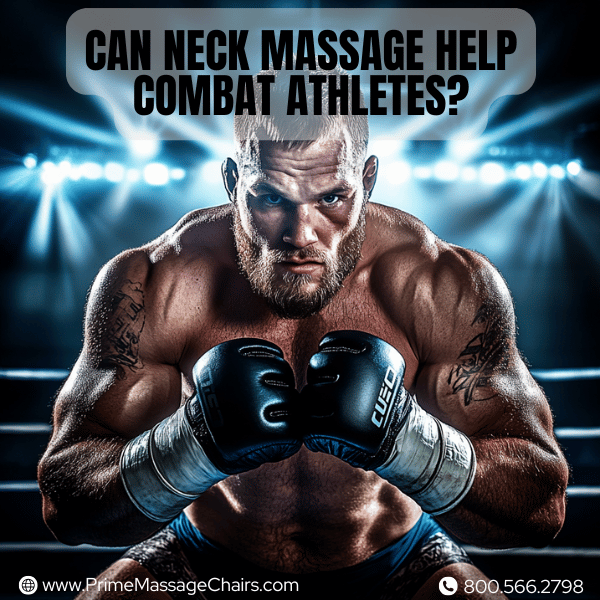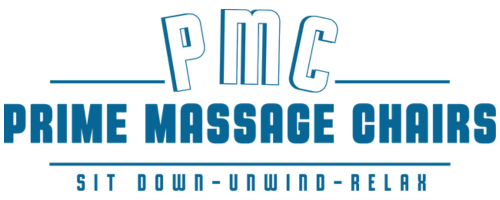
Can Neck Massage Help Combat Athletes?
Can neck massage help combat athletes? Many fighters rely on massage therapy to reduce muscle strain and improve recovery after intense training.
This article will discuss how neck massage may benefit fighters.
Keep reading to learn more!
The Role of Neck Massage in Sports Performance
Neck massage may support sports performance, especially for combat athletes. This therapy may help muscle recovery and ease pain from injuries during sports.
Neck and shoulder pain may result from muscle tension, poor posture, or injuries, and it may cause discomfort and limited movement.

Massage therapy may often be used as a method to help relieve muscle tightness and improve mobility.
Combat sports may include quick actions that may strain the neck. Neck massages may help relax muscles, ease tension, and support overall comfort in these areas.
For fighters aiming for peak performance, regular neck massages may shorten the rest time needed for soreness or injury recovery.
Regular therapeutic massage may be linked to better athletic performance and faster recovery among professional athletes.
Physical Benefits of Neck Massage for Combat Athletes
Massage therapy for combat athletes may enhance blood flow to muscles, supporting recovery and reducing muscle tension.
This may improve flexibility and lower the risk of injury, helping athletes stay competitive.
Improved Circulation and Muscle Recovery
Neck massages may increase blood flow, delivering more oxygen and nutrients to muscles.
This improved circulation may support healing after workouts and reduce stiffness and soreness.
By helping remove waste products like lactic acid from muscles, these massages may contribute to faster recovery for athletes.
By promoting muscle relaxation and reducing tension, neck massages may help lower the risk of strains and other injuries, which may contribute to improved sports performance.
Reduced Muscle Tension and Soreness
Combat athletes often experience muscle tension and soreness from intense training.
A neck massage may reduce this discomfort, helping muscles relax and assisting healing after workouts or matches.
Techniques like effleurage, using light strokes, and petrissage, kneading the muscles, may support blood flow to the neck area. They may also aid in removing toxins that contribute to pain.

Regular neck massages may help muscles stay more relaxed and speed up recovery.
This may allow athletes to train harder and perform better without discomfort slowing them down.
By reducing soreness, these massages may also help prevent injuries by maintaining muscle health.
Enhanced Flexibility and Range of Motion
Reducing muscle tension and soreness may improve flexibility and range of motion.
This benefit may be important for athletes, especially those in combat sports who rely on quick reflexes and wide movements.
A neck massage may support greater flexibility in the neck and shoulder areas, allowing for improved movement.
Athletes who receive neck massages may notice increased ease of movement in their neck and shoulders, which may support flexibility and mobility.
These improvements may be useful for competition preparation, offering small yet significant advantages.
Enhanced flexibility from neck massage may help fighters dodge more effectively and strike from different angles, possibly reducing the risk of injuries.
Good movement without strain may also help keep an athlete’s body prepared for training or competition.
Massage therapy is a complementary approach and should be used alongside other medical treatments as advised by a professional.
Psychological Benefits of Neck Massage
Neck massages may help lower stress and improve focus by calming nerves. This therapy may aid in facing challenges with a clearer mind.
Reduced Stress and Anxiety
Massage therapy may support focus and performance in athletes by helping to reduce stress and anxiety.
During a massage, the body may experience physiological responses that promote relaxation and improve mood.
Regular massage sessions may help athletes concentrate better and think more clearly. This mental boost could aid in performing under pressure and may assist with recovery after workouts or competitions by easing fatigue and worry.
With reduced stress, athletes may be able to push themselves harder during training sessions and recover more efficiently.
Improved Focus and Mental Clarity
Neck massages may increase focus and mental clarity for combat athletes.
This process could support serotonin and dopamine production, which may enhance mood and well-being.
A positive mood may help athletes stay sharp and driven, especially during competition preparation. These psychological benefits could play a role in an athlete's mental health.

Many fighters include regular neck massages in their training routines. It may help them stay focused on their goals by reducing stress from tight muscles. As a result, they may concentrate better in practice or matches.
Sports massage may help athletes by reducing muscle tension, promoting relaxation, and supporting overall recovery, which could contribute to improved performance.
Massage Techniques for Combat Athletes
Deep tissue, active release, and trigger point techniques may help combat athletes manage muscle tension and improve performance. These massage therapies may target discomfort to support relaxation and healing.
Deep Tissue Massage for Chronic Muscle Pain
Deep tissue massage may be effective for relieving muscle tension by using firm pressure and slow strokes to target deep muscle layers and connective tissues.
This technique could help release tightness, break up adhesions, and improve blood flow to support relaxation and recovery.
- This massage may focus on hard-to-reach muscle layers to help reduce tightness.
- It could support those with long-term back discomfort.
- By potentially lowering heart rate and blood pressure, it may promote relaxation.
- Improved blood flow may assist the body's natural healing process.
- Reduced stress could lead to a calmer, more focused state.
- Though beneficial for sustained relief, it may cause some discomfort.
- Enhances mobility by potentially improving joint flexibility.
- Athletes may benefit from pre-event and post-event massages for recovery.
- Choosing a therapist skilled in sports injuries and athlete recovery is important.
Massage therapy is a complementary approach and should be used alongside other medical treatments as advised by a professional.
Active Release Techniques for Tension Relief
Active Release Techniques (ART) may be useful for combat athletes managing muscle stiffness.
This method may use specialized movements and pressure to break up scar tissue, supporting muscle function.
- A therapist may first identify tight spots in the athlete's muscles.
- They then apply a targeted hand movement to stretch these areas.
- The stretching is combined with the athlete's movement of the affected body part.
- The objective is to help break down scar tissue that could restrict motion and cause discomfort.
- Multiple sessions, typically ranging from three to six, may be necessary for noticeable improvement, depending on the severity of muscle tightness and scar tissue buildup.
- Chiropractors, physical therapists, and certified massage therapists may perform ART.
- Beyond reducing stiffness, ART could support an athlete’s movement efficiency.
- Consistent treatments may help maintain muscle flexibility and smoothness.
- Combat athletes may benefit from ART due to its focus on areas stressed by repetitive motions and high neck strain.
Choosing a skilled professional for ART is crucial for combat athletes aiming to maintain peak physical condition, avoid injuries, and enhance performance.
Trigger Point Therapy for Targeted Pain Areas
Trigger point therapy may help relieve muscle knots by applying focused pressure to specific areas of tightness, encouraging muscle relaxation and improving mobility.
- Therapists may locate trigger points behind discomfort.
- Applying pressure to these spots could help release the knot.
- Increased blood flow may speed up waste removal and recovery.
- This therapy may assist with arthritis pain, muscle strains, and backaches.
- It could also offer relief for sciatica pain.
- Athletes may experience a greater range of motion.
- Their performance could improve as well.
Always consult with a medical professional before using massage therapy as a treatment for pain or injuries.
Incorporating Neck Massage into Training
Incorporating neck massage into a training regimen may support preparation for events and aid in recovery, potentially helping athletes perform at their best.
Pre-Event Massage for Preparation
Pre-event massage may help combat athletes get ready for competition. It is typically done 10 to 60 minutes before the event begins.
This massage uses light strokes like gliding and pump compressions to prepare the body without lotions or oils.

Athletes may receive this therapy over their clothes, making it quick and clean. Sessions may last about 15 mins, depending on the athlete's needs.
This therapy may help warm up muscles and boost circulation before performance peaks are needed.
Since it does not use deep pressure, it may reduce the risk of muscle soreness affecting the athlete’s performance during their event.
Post-Event Massage for Recovery
After intense workouts or competitions, sports massages may support recovery. Research suggests that massage therapy could help athletes recover by reducing muscle tension and promoting blood flow. This may help lessen pain and swelling.
Short massages between 5-12 minutes may be most effective for recovery. Combat athletes should be aware that neck massages carry certain risks and require caution.
Always consult with a healthcare professional before using massage therapy as part of an athletic recovery routine.
FAQs
1. Can Neck Massage Help Athletes?
A regular sports massage, including neck massages, may help athletes in various ways. It could assist in reducing muscle soreness and stress while supporting athletic performance and recovery.
2. How Does Massage Therapy Aid In Rehabilitation For Athletes?
Massage therapy may offer several benefits for athlete rehabilitation. It could help increase flexibility, reduce muscle tension, and alleviate discomfort associated with injuries such as sprains or back pain.
3. What Kind of Benefits Do Therapeutic Massages Offer to Athletes?
Therapeutic massages may provide multiple benefits for athletes, from supporting performance by reducing muscle soreness to aiding in faster recovery post-exercise.
4. Does a Sports Massage Only Benefit Professional Athletes?
No, anyone who engages in regular exercise or strength training may experience the benefits of sports massage therapy, as it is designed to support recovery and performance.
5. How Does Physical Therapy Compare With Massage Therapy for Athlete Recovery?
Both physical therapy and massage therapy may play important roles in an athlete's recovery process. They could complement each other when used together as part of rehabilitation programs.
Conclusion
Can neck massage help combat athletes? Regular sessions could help manage pain, improve circulation, and prevent common neck injuries.
This could lead to greater mobility and less discomfort after workouts. Selecting the correct massage technique is essential.
Disclaimer:
We do not provide medical advice. The content of this article, including text, graphics, and other material, is for informational purposes only. It is not intended to be a substitute for professional medical advice, diagnosis, or treatment. Always seek the advice of your physician or other qualified health provider with any questions you may have regarding a health condition. Never disregard professional medical advice or delay in seeking it because of something you have read in this article or on our website.
